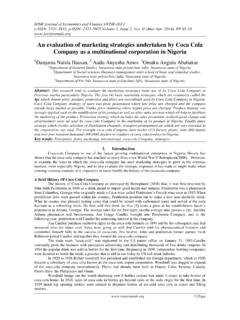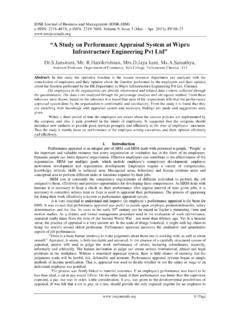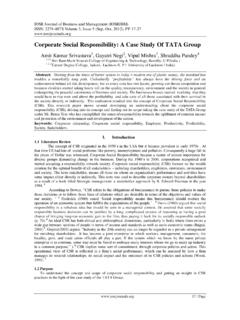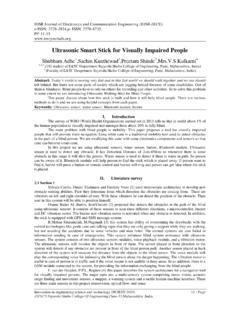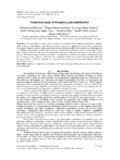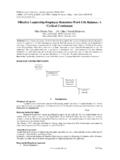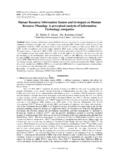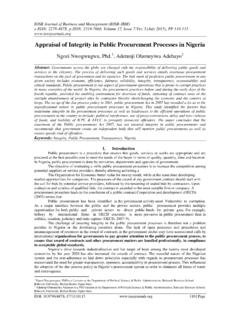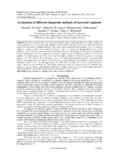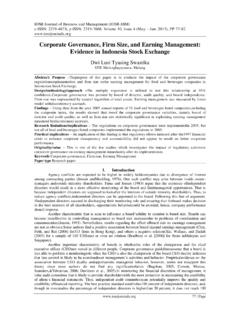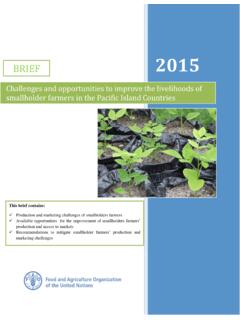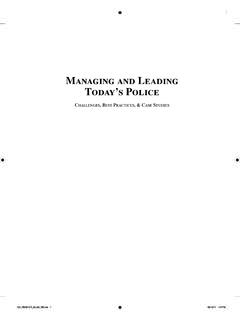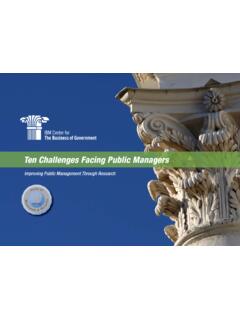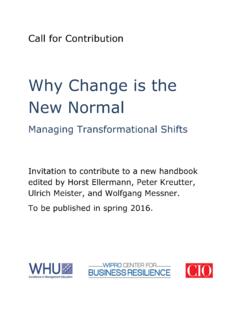Transcription of Organization Behaviour: Challenges and Opportunities
1 IOSR Journal of Business and Management (IOSR-JBM) e-ISSN: 2278-487X, p-ISSN: 2319-7668. Volume 20, Issue 1. Ver. VIII (January. 2018), PP 47-51 DOI: 47 | Page Organization Behaviour: Challenges and Opportunities Neenu Sharma HOD- Commerce Deptt. SDAM College, Dinanagar Corresponding Author: Neenu Sharma Abstract: Business in today s world is a hectic and dynamic undertaking. The environment in which organizations operate is ever changing, thereby changing the needs of the Organization and internal operations. The concept of Organization behaviour is important as it provides insights into organizations Challenges and Opportunities .
2 Although Organization behaviour varies from one Organization to another, its usefulness is universal. By studying these behaviours organizations become more aware of their business ethics and are able to positively find ways to transfer their employee's attitudes and behaviours into more positive experiences personally and for the company. Most organizations realize that being ethical is good business practice and pays in the long run. Key Words: Organization Behaviour, Technology, People. ---------------------------------------- ---------------------------------------- ---------------------------------------- --------------- Date of Submission: 15-01-2018 Date of acceptance: 03-02-2018 ---------------------------------------- ---------------------------------------- ---------------------------------------- ------------- I.
3 Introduction Organisations are social systems. Organisations are combination of science and people-technology and humanity. Business in today s world is a hectic and dynamic undertaking. The environment in which organizations operate is ever changing, thereby changing the needs of the Organization and internal operations. As needs change, the leadership and internal dynamics must be reviewed. The concept of Organization behaviour is important as it provides insights into organizations Challenges and Opportunities . Although Organization behaviour varies from one Organization to another, its usefulness is universal. organizational Behaviour is the study and application of knowledge about how people, individuals, and groups act in organizations.
4 It interprets people- Organization relationships in terms of the whole person, whole group, whole Organization , and whole social system. II. Meaning OB is a field of study that investigates the impact that individuals, group and structure have on behaviour within the organisation. Organizational behaviour is the analysis of human dynamics in an Organization . It helps human resources professionals and business leaders understand the relationships between themselves and their employees. Additionally, it reveals a great deal about how employees on the same level interact with each other. Organizational behaviour is about people at work in all kinds of organizations and how they may be motivated to work together in more effective ways.
5 By studying these behaviours organizations become more aware of their business ethics and are able to positively find ways to transfer their employee's attitudes and behaviours into more positive experiences personally and for the company. Most organizations realize that being ethical is good business practice and pays in the long run. According to Callahan, Fleenor and Kudson Organizational Behaviour is a subset of management activities concerned with understanding, predicting and influencing individual behaviour in organisational setting. Thus organizational Behaviour is the study and application of knowledge about how people, individuals, and groups act in organizations. It does this by taking a system approach.
6 That is, it interprets people- Organization relationships in terms of the whole person, whole group, whole Organization , and whole social system. History While Organizational Behaviour as a field of academic study wasn t fully recognized by the American Psychological Association until the 1970 s, it s roots go back to the late 1920 s when the Hawthorne Electric Company set up a series of experiments designed to discern how changes in environment and design changed the productivity of their employees. Their various studies, conducted between the years of 1924 and 1933, were broad and meticulously measured over large periods of time. Organizational behaviour has focused on various different topics of study. Since the 1970 s, a good deal of the work being done in the field of organizational behaviour has been on cultural components of organizations, including topics such as race, class, gender roles, and cultural relativism and their roles on group building and productivity.
7 These studies, a part of a shift in focus Organization Behaviour: Challenges and Opportunities DOI: 48 | Page in the field towards qualitative research, and among other things, take into account the ways in which identity and background can inform decision making. Key Elements of Organisational Behaviour The key elements in organizational behaviour are:- People Structure Technology Environment People People make up the internal social system of the Organization . They consist of individuals and groups, and large groups as well as small ones. People are the living, thinking, Feelings beings who created the organizations. It exists to achieve their objectives. Organizations exist to serve people.
8 People do not exist to serve organizations. The work force is one of the critical resources that need to be managed. In managing human resources, managers have to deal with: i) Individual employee who are expected to perform the tasks allotted to them ii) Dyadic relationships such as superior-subordinate interactions iii) Groups who work as teams and have the responsibility for getting the job done, iv) People outside the Organization system such as customers and government officials Structure Structure defines the official relationships of people in organizations. Different jobs are required to accomplish all of an Organization s activities. There are managers and employees, accountants and assemblers. These people have to be related in some structural way so that their work can be effective.
9 The main structure relates to power and to duties. For example, one person has authority to make decisions that affect the work of other people. Organizations can be structured as relatively rigid, formalized systems or as relatively loose, flexible systems. Thus the structure of the organizations can range on a continuum of high rigidity to high flexibility. Technology The type of technology used in the organisations has significant influence on the working relationships among individuals and employees. It allows people tom do more work and that too in better way. Now managers are under tremendous pressure to maintain delicate balance between technical and social systems. Environment No organisation exists in vacuum.
10 They have to operate within an internal and external environment. Environment influences the attitude of people, affects working conditions and provides competition for resources and power. Challenges and Opportunities for Organizational Behaviour Improving People Skills: Technological changes, structural changes, environmental changes are accelerated at a faster rate in business field. Unless employees and executives are equipped to possess the required skills to adapt those changes, the achievement of the targeted goals cannot be achieved in time. There two different categories of skills managerial skills and technical skills. Some of the managerial skills include listening skills, motivating skills, planning and organizing skills, leading skills, problem solving skill, decision making skills etc.
